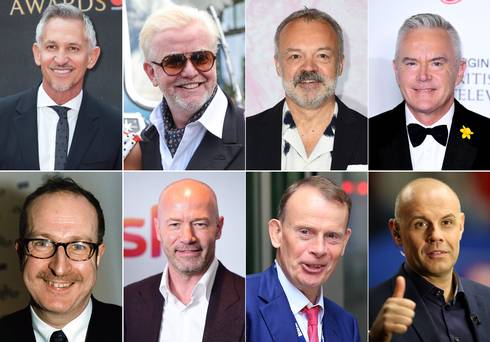Another summer, another row about how much television’s best paid presenters are earning. Only this time, it’s not RTE that’s in the firing line, it’s the BBC.
Since 2017, the corporation has been compelled to release the previous year’s salary details for everyone on the payroll earning more than £150,000, or €167,000 (for the sake of context, all figures from now on will be in euro).
Inevitably, though, the media attention is always focused on those who make up the top 20. Once again, the star at the very top of the tree is Gary Lineker, who pulled in a hefty €1.95m in 2018.
Lineker — who, unlike some male presenters, refused to take a salary cut in the wake of last year’s gender inequality pay controversy — anchors all of the BBC’s live football, excepting this year’s Women’s World Cup, and presents Match of the Day every Saturday throughout the Premier League season.
In second place is Chris Evans, who’s since left the BBC, on €1.39m. Graham Norton comes third on €679,000. If this seems comparatively modest for such a high-profile presenter, it’s because it doesn’t include his fee for The Graham Norton Show, which is paid through the independent production company that makes it, and is therefore not subject to disclosure. His actual salary is probably nearer to €2.3m.
The others on the to 20 list are Huw Edwards (€546,000); Steve Wright (€517,000); Alan Shearer (€489,000); Andrew Marr (€434,000); Zoe Ball (€411,000); Claudia Winkleman (€411,000); Vanessa Feltz (€395,000); Jason Mohammad (€395,000); Nicky Campbell (€378,000); Stephen Nolan (€361,000); George Alagiah (€350,000); Nick Grimshaw (€344,000); Lauren Laverne (€339,000); Nick Robinson (€322,000); John Humphrys (€322,000); Jeremy Vine (€322,000) and Gabby Logan (€322,000).
Gratifyingly, there are substantially more women on the list this year, and better paid than before, due to the BBC’s attempt (belated, but still welcome) to close the yawning gender pay gap.
None of this, however, has stopped the usual right-wing, anti-BBC suspects in the British media jumping on the “staggering” (The Telegraph), “sky-high” (The Sun) salaries as an example of the corporation’s wastefulness. How, they ask, can the BBC justify paying out such enormous sums when it plans to axe free TV licences for most over-75s?
What’s being conveniently played down is that the BBC never wanted to axe the free licences. It’s being forced to do so by the Conservative government’s legislation. It’s transparently a cynical act of misdirection and scapegoating.
The BBC’s argument is that the top-paid people are worth the money because they bring in the viewers. If they didn’t pay them enough, they’d quickly be poached by ITV or some other commercial rival.
This is the same rationale RTE used back in the early to mid-2000s, when Pat Kenny was pocketing €850,000, Gerry Ryan was bringing home €600,000 and Marian Finucane was raking in €500,000-plus — even though there was never any evidence other broadcasters were beating the door down to lure them away from Montrose.
In the case of the BBC, though, the argument is valid. ITV pays Piers Morgan about €1.3m just for Good Morning Britain; he gets extra for other shows. Ant and Dec’s current ITV deal is worth €40m. Imagine what ITV would be willing to pay to have Lineker, Norton or any of the other top 20 on their books.
Not for the first time the British public don’t seem to know how lucky they are.
Even with those star salaries, their €171 licence fee gives them a first-rate TV, radio and online service. They should try looking at what we get for our €160.
If you could exchange TV presenters over the post-office counter the same way you exchange currency, Ray D’Arcy (current price €450,000) would be enough to buy you the whole of Gabby Logan and roughly a third of Zoe Ball. I’d take that exchange rate any day.
Read more: How Graham Norton joined Britain’s best-paid TV elite
Claudia Winkleman, Vanessa Feltz and Zoe Ball – three women among BBC top 10 earners
Source: Read Full Article
